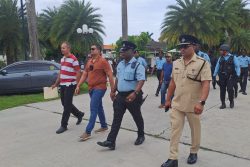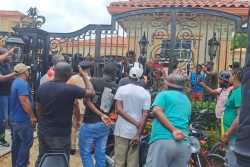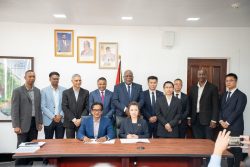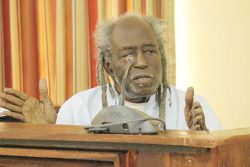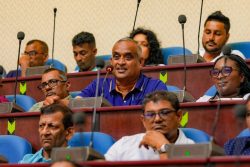As revealed by President Granger in his address to the National Assembly last Thursday, Venezuela has once again attempted to intimidate a foreign investor, the Guyana Goldfields. The President referred to Venezuela’s history of intimidation starting with the seizure of Ankoko in 1966, then the Rupununi Uprising in 1969, and its continuation since that time. The fact that the Good Officer Process has been ongoing for the past 25 years has not moderated Venezuela’s relentless energy in its irredentist pursuits, which the President has correctly characterized as unlawful interference in Guyana’s internal affairs.
 Venezuela no doubt wishes the continuation of the same Good Officer process so that it will remain free to engage in its hostile activity towards Guyana. The ultimate objective of its economic and escalating military intimidation is to prevent Guyana from developing its economy and military so as to eventually force us in desperation to settle the border controversy by ceding territory.
Venezuela no doubt wishes the continuation of the same Good Officer process so that it will remain free to engage in its hostile activity towards Guyana. The ultimate objective of its economic and escalating military intimidation is to prevent Guyana from developing its economy and military so as to eventually force us in desperation to settle the border controversy by ceding territory.
Former President Jagdeo revealed that his Govern-ment had already succumbed to the temptation by considering offering Venezuela an outlet into the Atlantic. It is not known whether Mr. Jagdeo was advised that Venezuela already has innocent passage to the Atlantic under the Law of the Sea Convention, even though it is not signatory, and doesn’t need a ‘maritime channel.’ But assuming that Venezuela had accepted Mr. Jagdeo’s foolhardy scheme, after digesting that morsel, there is no doubt that the next generation would have come for more.
The parties to the Geneva Agreement, which included then British Guiana and Venezuela, clearly intended that a time frame should exist for the settlement of the controversy. The Mixed Commission had a specific lifespan of four years. If there was no settlement both Guyana and Venezuela agreed to choose “without delay” one of the means of peaceful settlement provided in Article 33 of the UN Charter. The submission of the report of the Mixed Commission and agreement on a method under Article 33 had both to be accomplished within three months after the expiration of the four-year period. These provisions clearly demonstrate that the signatories to the Geneva Agreement intended that time should be of the essence. It was certainly not intended that the processes under the Geneva Agreement should be open-ended and that the controversy should persist unresolved over decades.
Article IV in its entirety states:
(1) If, within a period of four years from the date of this Agreement, the Mixed Commission should not have arrived at a full agreement for the solution of the controversy it shall, in its final report, refer to the Government of Guyana and the Government of Venezuela any outstanding questions. Those Governments shall without delay choose one of the means of peaceful settlement provided in Article 33 of the Charter of the United Nations.
(2) If, within three months of receiving the final report, the Government of Guyana and the Government of Venezuela should not have reached agreement regarding the choice of one of the means of settlement provided in Article 33 of the Charter of the United Nations, they shall refer the decision as to the means of settlement to an appropriate international organ upon which they both agree or, failing agreement on this point, to the Secretary General of the United Nations. If the means so chosen do not lead to a solution of the controversy, the said organ or, as the case may be, the Secretary General of the United Nations shall choose another of the means stipulated in Article 33 of the Charter of the United Nations, and so on until the controversy has been resolved or until all the means of peaceful settlement there contemplated have been exhausted.
Sub-clause 2 is clear. It is within the absolute discretion of the Secretary General to choose a means of settlement. If that method fails, the Secretary General again has an absolute discretion; he or she “shall choose” another method as stipulated in Article 33. Among the methods stipulated is “judicial settlement.” Therefore, the Secretary General does not need the consent of either Guyana or Venezuela in determining his choice. He can choose judicial settlement by his own independent judgment, the Good Officer Process having clearly failed.
Before the Secretary General chooses a judicial settlement, in which case he will refer the matter to the International Commission of Jurists, (“ICJ” also known as “the World Court”) he must satisfy himself that the ICJ has jurisdiction. Article 36 of the ICJ’s Statute gives it jurisdiction over “all cases which the parties refer to it and all matters specially provided for in the Charter of the United Nations or in treaties and conventions in force.”
The Geneva Agreement is a treaty, certainly within the contemplation of Article 36. The provisions of the Geneva Agreement, set out above, provide for a “judicial settlement” to be chosen by the Secretary General. There can be little doubt, therefore, that notwithstanding the dozens of complex cases which deal with the jurisdiction of the ICJ, that it does indeed have jurisdiction, both countries having agreed to a judicial settlement and having given the authority to the Secretary General of the UN to decide. The ball is now in the Secretary General’s court and Guyana must keep up the pressure for him to act.
